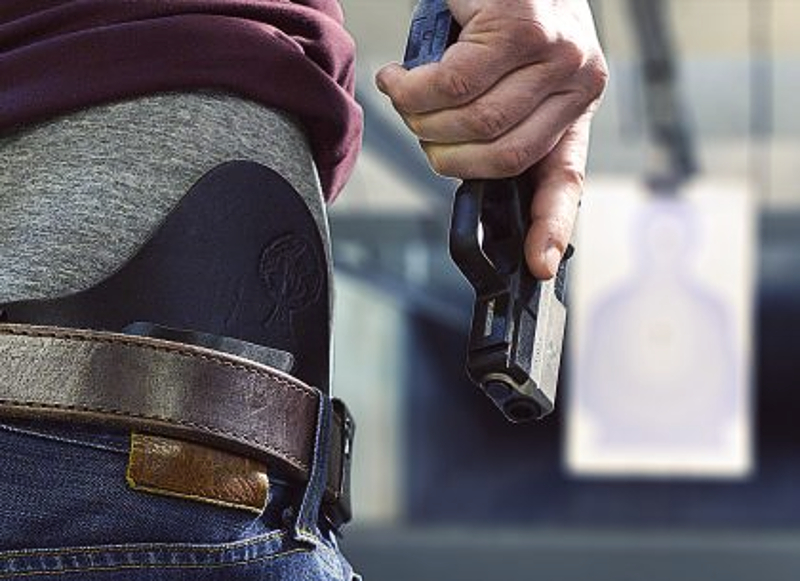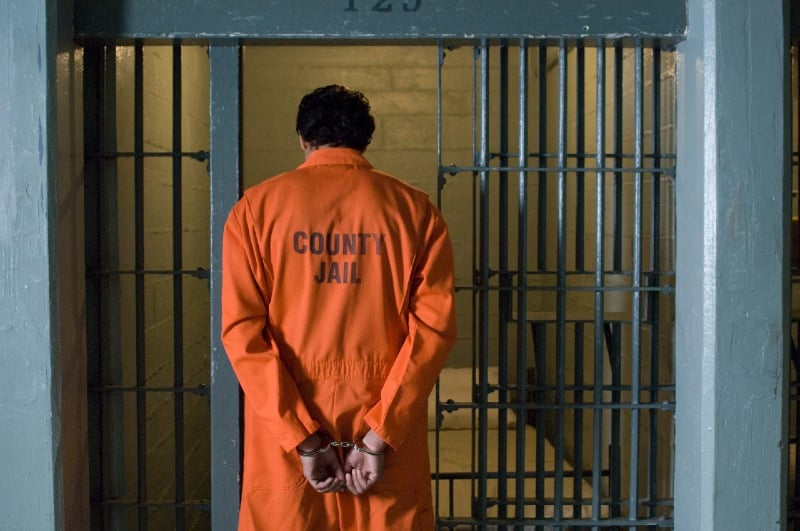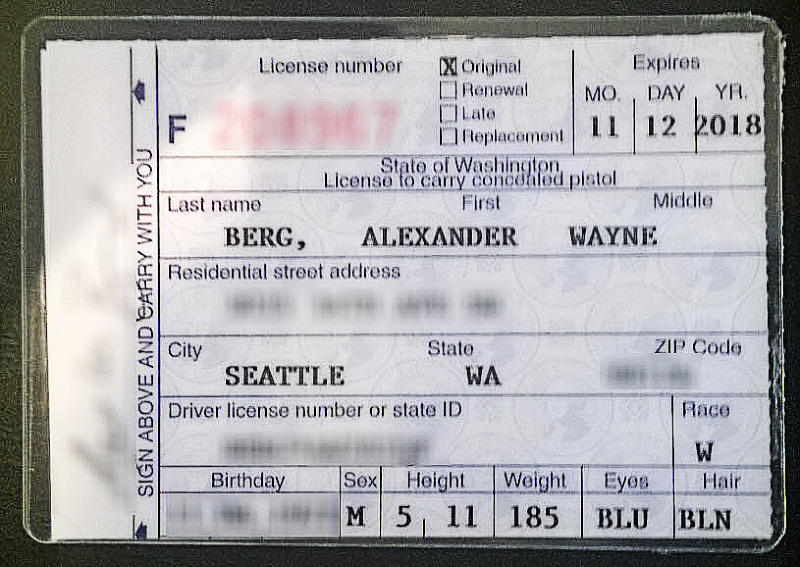Concealed carry is the practice of carrying a firearm or other weapon in such a manner that it cannot be readily seen by a casual observer. There are quite a few different ways to conceal firearms and a lot of laws that are dependent on where you live. Let’s take a closer look at what concealed carry is, how to properly conceal carry guns, and what some of the concealed carry laws might be. As always, remember that claiming ignorance of the law is never a valid legal defense, so it benefits you as a gun owner to familiarize yourself with the rules, regulations, and laws where you live or travel.

What is concealed carry?
Although we gave the general description answering “what is concealed carry,” above, there’s more detail to it. You wouldn’t attempt to conceal a rifle by slinging it over your back and wrapping yourself in a blanket any more than you’d try to conceal a handgun by tucking it in your shirt pocket. Concealed carry is about far more than hastily or lazily covering your firearm.
Correct concealed carry is done in accordance with safety and your local law. If your gun is printing so dramatically it’s extremely obvious even to the untrained eye, or if you repeatedly reveal your handgun when you raise your arms to get a box off the shelf at the grocery story, it’s not concealed. It sounds simple, and it really is: Concealed carry means concealed. If you’re carrying concealed, you are the only person who needs to know or be aware the gun is on your body.

Should you concealed carry?
Whether or not you should concealed carry is ultimately up to you, but it does involve a decision-making process. To concealed carry successfully, you will need to consider the following things:
- Are you prepared to draw your firearm and use it against a human being who poses an immediate, credible threat? Or are you hoping that brandishing your gun will prevent someone from trying to kill you?
- Are you willing to make necessary changes in your wardrobe?
- Do you spend a significant amount of time in non-permissive environments?
- Are you going to commit to regular training to ensure you’re a competent shooter?
- Do you want some sort of self-defense insurance? If so, what do you expect your self-defense insurance to cover?
- Are you also going to carry a tourniquet? You are statistically more likely to need that tourniquet for injuries that happen during a car accident than you are to need your firearm. If you carry a gun, why not also make room for a tourniquet?
- Are you going to invest the time and money needed to figure out the correct concealed carry setup for your needs, body shape, and experience level?
- Do you plan to train routinely from the holster you carry with, using your daily carry gun?
- Do you truly understand the gravity of this decision and what it could possibly entail?
One of the most difficult things for many people to come to grips with is the fact that they might need to use deadly force to stop a threat. If you’re hoping to scare off an attacker by drawing your gun or intend to fire at their leg to try to avoid seriously injuring them, you should probably reconsider carrying a firearm for defensive purposes. It’s a major decision and not one that should be made lightly.

Can you concealed carry?
Concealed carry is legal in most of the United States within specific parameters. Each state has a different set of laws covering how a person can and cannot conceal a firearm—and where they’re allowed to do it. Generally speaking, a person must be 21 years old of age or older to carry concealed firearms. Some states, including Alabama and Montana, allow concealed carry at the age of 18. Many states—half the country as of June 2022—have permitless carry, and it’s important to understand there are still age restrictions in permitless or constitutional carry states.

Who can not concealed carry?
As far as who can concealed carry, it depends on the specific state you reside in (or are traveling through). All states have age restrictions on concealed carry. For example, it’s safe to assume you cannot legally concealed carry if you are under the age of 18. Other issues that could legally prohibit you from carrying include:
- Being a convicted felon
- Using street drugs
- Using marijuana, even in states where it’s allowed for medical use
- Being addicted to controlled substances
- Being a fugitive from justice
- Have been adjudicated mentally unstable/defective
- Are an illegal alien
- Have been dishonorably discharged from the military
- Renounced your United States citizenship
- Have been convicted of a misdemeanor for domestic violence
This is not an exhaustive list and the prohibitions on carrying a firearm do vary by state. Not only do you need to be familiar with the laws regarding concealed carry in the state you reside in but you should check the laws in any state you intend to travel through or visit.
How do you concealed carry?
Assuming you are legally eligible to possess and carry a firearm, proper concealed carry can be done with the correct holster and gun belt. There are some cases where it is necessary to adjust your wardrobe to concealed carry but that is not always true. The most likely scenarios where the way you dress will have to be altered are when wearing extremely tight or short pieces of clothing such as spandex or belly-baring tops. It might come down to being forced to consider the pros and cons of wearing the cute crop top you want or carrying a concealed firearm.
To conceal carry successfully, you’ll need a few specific items:
- A reliable, accurate handgun that fits your hands
- A quality holster
- A sturdy gun belt
- A concealed carry permit (in states without permitless carry)
- Good defensive ammunition
- A cover garment for concealment or a wardrobe that works to conceal your handgun

Prior to purchasing a holster, stop and consider where on your body you want to carry your pistol. There are a few common carry methods, all of which have pros and cons:
- Strong side hip
- Off-side hip (cross-draw)
- AIWB (Appendix Inside Waistband)
- Small of Back (SOB)
- Shoulder
- Ankle
- Belly Band
- Bra
- Pocket carry

Of the above options, the ideal conceal carry methods are AIWB and strong side hip. Because you would be concealed carrying, the strong side hip method would most likely require what is known as an IWB—Inside Waistband—holster. It is possible to conceal an OWB—Outside Waistband—holster, but it’s far more difficult than concealing an IWB holster. Everyone’s body is different. What works for your spouse or friend might not work for you. Once you figure out where on your body you’d like to conceal carry, you can move on to finding the right holster to make it work.
Is it legal?
Concealed carry is legal in most of the United States within specific parameters. Each state has a different set of laws covering how a person can and cannot conceal a firearm—and where they’re allowed to do it. Generally speaking, a person must be 21 years old of age or older to carry concealed firearms. Some states, including Alabama and Montana, allow concealed carry at the age of 18. Many states—half the country as of June 2022—have permitless carry, and it’s important to understand there are still age restrictions in permitless or constitutional carry states.

What the law does or does not say about concealed carry practices depends on the state.
Certain states are significantly more restrictive than others while most fall somewhere in the middle. To give you an idea of what some state laws say about concealed carry, here’s a random assortment of concealed carry laws:
Texas
The Lone Star State is among those that now have permitless carry in place. According to the Texas State Law Library, the following applies under the “handgun” heading:
A new law (HB 1927) took effect on September 1st, 2021. Now, people who qualify under the law can carry a handgun in a public place in Texas without a license to carry (LTC). Texans can still apply for an LTC since it may carry additional benefits.
Sections 46.02 and 46.04 of the Texas Penal Code describe unlawful carry and possession of a firearm. Generally, to carry a handgun in public in Texas without an LTC, a person must:
- Be at least 21 years old
- Not have a prior felony conviction as described in Texas Penal Code Section 46.04
- Not have a recent conviction for certain types of misdemeanors as described in Texas Penal Code Sections 46.02 and 46.04
- Not be subject to an unexpired protective order as described in Texas Penal Code Section 46.04(c)
- Not be restricted from possessing a firearm under federal law as described in 18 United States Code Section 922(g)
- Not be intoxicated, except in certain situations as described in Texas Penal Code Section 46.02(a-6)
The new Texas law does not give the right to carry a handgun to anyone who was prohibited before the new law took effect. Section 2 of HB 1927 states that persons who are currently prohibited from possessing firearms under state and federal law will not gain the right to possess or carry a firearm under this legislation.
Washington State
In the Evergreen State, concealed carry laws fall somewhere in the middle between restrictive and permissive. At this time, Washington is a shall-issue state which means they will approve a concealed carry permit assuming the person is not legally prohibited from having one (meaning the person can pass a background check).

The following is a brief excerpt from the Washington State Office of the Attorney General page:
RCW 9.41.050
Carrying firearms.
(1)(a) Except in the person’s place of abode or fixed place of business, a person shall not carry a pistol concealed on his or her person without a license to carry a concealed pistol.
(b) Every licensee shall have his or her concealed pistol license in his or her immediate possession at all times that he or she is required by this section to have a concealed pistol license and shall display the same upon demand to any police officer or to any other person when and if required by law to do so. Any violation of this subsection (1)(b) shall be a class 1 civil infraction under chapter 7.80 RCW and shall be punished accordingly pursuant to chapter 7.80 RCW and the infraction rules for courts of limited jurisdiction.
(2)(a) A person shall not carry or place a loaded pistol in any vehicle unless the person has a license to carry a concealed pistol and: (i) The pistol is on the licensee’s person, (ii) the licensee is within the vehicle at all times that the pistol is there, or (iii) the licensee is away from the vehicle and the pistol is locked within the vehicle and concealed from view from outside the vehicle.
(b) A violation of this subsection is a misdemeanor.
(3)(a) A person at least eighteen years of age who is in possession of an unloaded pistol shall not leave the unloaded pistol in a vehicle unless the unloaded pistol is locked within the vehicle and concealed from view from outside the vehicle.
(b) A violation of this subsection is a misdemeanor.
(4) Nothing in this section permits the possession of firearms illegal to possess under state or federal law.
California
The state of California is a may-issue one, meaning a person must not only pass a background check and undergo any related training, but they must prove to law enforcement that there is an immediate, credible threat requiring them to need to carry a gun for protection. It’s not easy to get a concealed carry permit in California, and there have been people injured and killed while waiting for law enforcement to decide whether they’re in enough danger to warrant being granted a concealed carry permit.

On Rob Bonta, Attorney General’s website, there is extensive information about California’s firearms laws and concealed carry, including answers to the following questions:
May I carry a concealed firearm in California?
Generally you may not carry a concealed firearm on your person in public unless you have a valid Carry Concealed Weapon (CCW) license. CCW licenses are issued only by a California county sheriff to residents of the county, or the chief of police to residents of the city. California law does not honor or recognize CCW licenses issued outside this state.
(Pen. Code, §§ 25400-25700, 26150-26225.)
I am moving into California and I own several firearms. What are the new-resident registration requirements?
You are considered a personal firearm importer as defined by California law. You may bring all of your California-legal firearms with you, but you must report them all to the California Department of Justice within 60 days as required utilizing the New Resident Firearm Ownership Report (BOF 4010A), pdf. You may not bring ammunition feeding devices with a capacity greater than ten rounds, machine guns, or assault weapons into California.
(Pen. code, §§ 17000, subd. (a), 27560.)
These examples are given to show you how different the laws are in various states. As you can see, the difference in concealed carry laws in shall issue versus may issue versus permitless carry states (Washington, California, and Texas, in this case) is significant. Before you start concealed carrying a firearm, research and read the laws for your state, and do so on a government site rather than utilizing an outside source that might not be accurate or up to date.
Bottom line: We can make all manner of generalizations regarding the legalities of concealed carry, but every state is different and the laws change on a regular basis. It’s up to you, as a responsible gun owner, to know the laws specific to your state of residence and any state you intend to travel through or spend time visiting.
Frequently Asked Questions
What is a concealed carry permit?
There are a lot of different names for “concealed carry permit.” The exact title varies by state. Some states require a gun owner to have a concealed carry permit only for concealed carry while others require it for open carry as well. This permit is acquired by meeting the requirements for that specific state, whatever those may be, and paying the required fee.
What is a concealed carry gun?
A gun that’s referred to as a concealed carry gun is one designed for concealment. What this means is that its dimensions will be reduced, streamlined, or otherwise altered—or specifically designed—to make it easier to conceal under the user’s clothing.
How old do I have to be to concealed carry?
This varies by state. Generally speaking, you must be 21 years of age or older to carry a gun, but some states allow it at 18. Check your local laws.
Do I need training to carry a gun?
It is recommended you get the appropriate training, and maintain it if you intend to carry a firearm for defensive use.
Can a convicted felon carry a gun?
Generally speaking, no. The specifics surrounding firearms and felons depend on the state. Check your local laws.
Can I only carry certain kinds of guns?
When it comes to what guns can be used for concealed carry, it depends on the state. Most states allow gun owners to choose what gun they carry, but certain restrictive states—such as California—have lists of guns that are allowed.


